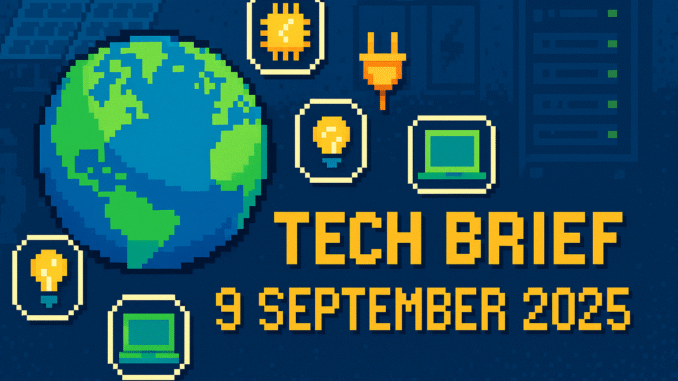
Tech Brief 9 September 2025 lands as government, industry, and history all argue with the chaos of living in a digital world. Bureaucrats just released a mega-list of tech, Scotland’s building battery bunkers, and somewhere in Gibraltar, servers are humming beneath sunny skies. It’s a day for sifting the details and appreciating what isn’t easily boxed up.
Missed yesterday’s Tech Brief? Catch up here before diving in.
Whitehall’s 350-Tech Blueprint: Government Crafts New Taxonomy
“There’s nothing more British than wrestling with a list that gets longer every time you look at it.” That’s from a government civil servant tasked with wrangling 350 ’emerging technologies’ into eight neat categories, six layers deep. The taxonomy, designed by the Government Office for Science, might just be our most official attempt yet at charting the tech wilderness. Why does it matter? The system shapes which innovations get scrutiny, guidance, or gold stars, and which slip by. For users who still remember the dizzying array of BBC Micro upgrades, this feels familiar. Now, AI, biotechnology, and more get the same spreadsheet treatment once reserved for 80s expansion ROMs. Is this good news for home-grown British inventors? Possibly. At least future lists might finally make sense, even if we know another new acronym is lurking around the corner.
Scotland’s Battery Industry Banks on Net Zero
Can Scotland’s battery sector power the future beyond Tesla? Invinity Energy Systems, near Edinburgh, is betting on it. Right now, their vanadium battery units, safely sealed inside shipping containers, are being built to scale up the UK’s national grid. These lo-fi, industrial-looking giants offer a solution to long-duration energy storage, which is crucial for solar and wind to really matter. They’re not aiming for style points, and that’s sort of the point. While the world swoons over lithium, British engineers are quietly assembling the groundwork, drawing from decades of practical, nuts and bolts innovation. Anyone who grew up patching together Amstrad PSUs will appreciate the ambition: bigger, messier batteries ready to support tomorrow’s surges and spikes. The only thing missing is the faint aroma of solder behind the loading bay.
Gibraltar’s £1.8B Data Bet: The Rock Targets AI Gold
Bold move, or digital daydream? The Gibraltar government says yes to a £1.8 billion, 250-megawatt datacentre to position the British Overseas Territory as a Mediterranean AI hub. Here’s the twist: The Rock is best known for military intrigue and Barbary macaques, not cloud hosting. Locals hope the project spurs new jobs and attracts international tech firms, yet also worry about energy draw and environmental pressures. There’s no mention of how the new power needs might ripple out, but it’s worth remembering the story above on battery innovation. Big storage and big compute can’t thrive without robust local infrastructure. As one industry analyst noted, “It’s like putting a high-end workstation in a garden shed; it only works if the mains keep up.” No shed, no AI.
From the Wayback Machine
On This Day: 1947 – The Harvard Mark II logbook records the first “computer bug.” A real moth, lodged in a relay, halts operations and is taped into history. Grace Hopper’s team immortalises “debugging” for generations. Later engineers will see themselves in this-sometimes the real fault is moths or burnt toast in the power supply, not bad code.
Today’s Big Question
Bureaucrats categorise, engineers improvise, and old bugs haunt new kit. Tech Brief 9 September 2025 shows no list, datacentre, or battery setup ever really tames the chaos. What’s your favourite moment of creative tech problem-solving: when did you win against the unexpected?
Stay curious, keep the magnifying glass handy, and try not to blame the insects for everything that breaks. Until tomorrow, solder on.
Missed yesterday’s Tech Brief? Catch up here

Leave a Reply